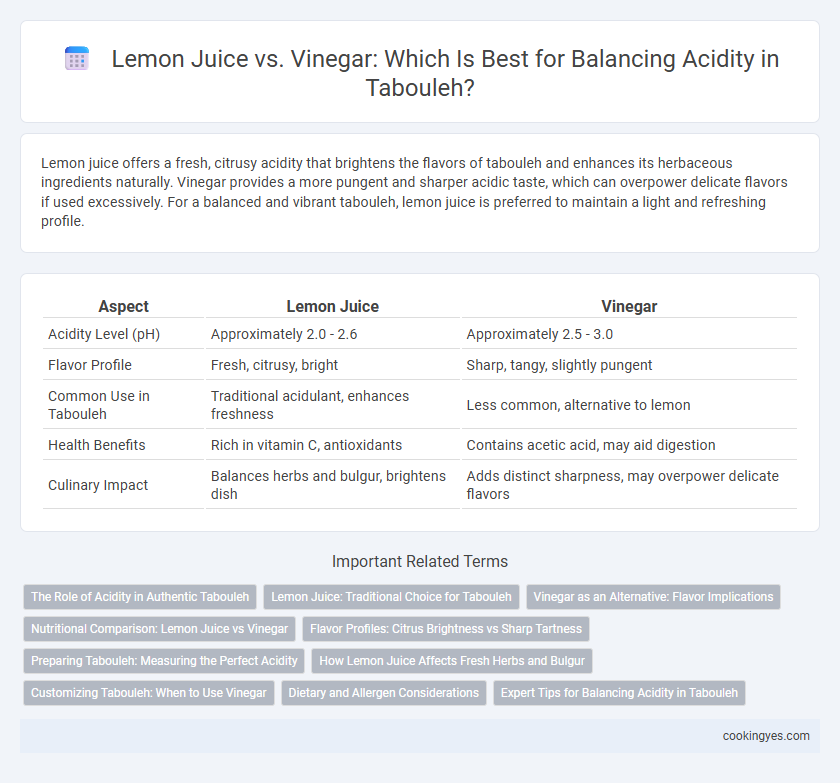Lemon juice offers a fresh, citrusy acidity that brightens the flavors of tabouleh and enhances its herbaceous ingredients naturally. Vinegar provides a more pungent and sharper acidic taste, which can overpower delicate flavors if used excessively. For a balanced and vibrant tabouleh, lemon juice is preferred to maintain a light and refreshing profile.
Table of Comparison
| Aspect | Lemon Juice | Vinegar |
|---|---|---|
| Acidity Level (pH) | Approximately 2.0 - 2.6 | Approximately 2.5 - 3.0 |
| Flavor Profile | Fresh, citrusy, bright | Sharp, tangy, slightly pungent |
| Common Use in Tabouleh | Traditional acidulant, enhances freshness | Less common, alternative to lemon |
| Health Benefits | Rich in vitamin C, antioxidants | Contains acetic acid, may aid digestion |
| Culinary Impact | Balances herbs and bulgur, brightens dish | Adds distinct sharpness, may overpower delicate flavors |
The Role of Acidity in Authentic Tabouleh
Acidity in authentic tabouleh is crucial for balancing flavors and enhancing freshness, with lemon juice traditionally preferred for its bright, citrusy tang that complements the parsley and bulgur. Lemon juice provides a natural acidity rich in vitamin C, contributing to the salad's vibrant taste and aiding digestion. Vinegar, while acidic, introduces a sharper, more pungent flavor that can overpower delicate ingredients, making lemon juice the optimal choice for maintaining tabouleh's characteristic freshness and authenticity.
Lemon Juice: Traditional Choice for Tabouleh
Lemon juice is the traditional choice for acidity in tabouleh, prized for its fresh, bright flavor that enhances the dish's herbal notes. Its natural acidity balances the parsley and bulgur without overpowering, making the salad vibrant and refreshing. Unlike vinegar, lemon juice provides a subtle citrus aroma that authentically preserves the classic Middle Eastern taste of tabouleh.
Vinegar as an Alternative: Flavor Implications
Vinegar serves as a flavorful alternative to lemon juice in tabouleh, offering a sharper, more pungent acidity that enhances the freshness of parsley and bulgur. Unlike lemon juice's bright citrus notes, vinegar introduces a subtle tang with hints of sweetness or maltiness, depending on the type used, which can deepen the salad's complexity. Choosing vinegar over lemon juice may slightly alter the traditional taste profile but can provide a unique twist that complements the herbaceous and nutty elements in tabouleh.
Nutritional Comparison: Lemon Juice vs Vinegar
Lemon juice contains vitamin C and antioxidants that contribute to its nutritional value, while vinegar primarily offers acetic acid, which supports digestion and blood sugar regulation. Both lemon juice and vinegar provide acidity essential for balancing Tabouleh's flavors, but lemon juice adds a fresh citrus nutrient boost. Vinegar is lower in calories and has minimal vitamins but enhances probiotic benefits when unfiltered.
Flavor Profiles: Citrus Brightness vs Sharp Tartness
Lemon juice lends a vibrant citrus brightness to tabouleh, enhancing the fresh, herbaceous notes with subtle fruitiness and natural acidity. Vinegar provides a sharp tartness that adds a more pronounced, tangy edge, intensifying the salad's overall bite but can overpower delicate flavors. Balancing lemon juice preserves the traditional Mediterranean freshness, while vinegar introduces a bold contrast that changes the classic flavor profile.
Preparing Tabouleh: Measuring the Perfect Acidity
Lemon juice and vinegar both provide acidity in tabouleh, but lemon juice offers a fresher, citrusy flavor that complements the herbs and vegetables. The ideal acidity level for tabouleh is measured by balancing a tablespoon of lemon juice per cup of bulgur to enhance brightness without overpowering the salad. Using too much vinegar can introduce a harsher sourness, whereas lemon juice maintains the authentic, zesty profile essential to traditional Lebanese tabouleh.
How Lemon Juice Affects Fresh Herbs and Bulgur
Lemon juice enhances the flavor of fresh herbs in tabouleh by brightening their natural aromas without overpowering them, unlike vinegar which can sometimes mask delicate herb notes. The acidity in lemon juice helps to soften the bulgur, allowing it to absorb flavors more effectively while maintaining a light, refreshing texture. This natural citrus acidity balances the dish, creating a vibrant and harmonious blend that vinegar's harsher acid profile often fails to replicate.
Customizing Tabouleh: When to Use Vinegar
Vinegar can be used in tabouleh to create a sharper acidity that complements the fresh herbs and bulgur without overpowering the dish. It is particularly effective when the lemon juice is too mellow or unavailable, providing a tangy depth and balancing the other flavors. For a customized tabouleh, opt for vinegar when you want a more pronounced and enduring acidic note that enhances the salad's zestiness.
Dietary and Allergen Considerations
Lemon juice provides natural vitamin C and antioxidants, making it a nutrient-rich option for acidity in tabouleh, while vinegar, especially distilled or apple cider varieties, offers a sharper tang with lower calorie content. For individuals with allergies or dietary restrictions, lemon juice is less likely to cause adverse reactions compared to vinegar, which may contain sulfites or histamines triggering sensitivities. Choosing lemon juice supports a fresher flavor profile and may complement gluten-free and vegan diets more effectively than vinegar-based acidity.
Expert Tips for Balancing Acidity in Tabouleh
For optimal acidity in tabouleh, chefs recommend fresh lemon juice due to its bright, clean flavor that enhances the parsley's freshness and bulgur's nuttiness. Vinegar can be used as an alternative but tends to impart a sharper, more pungent tang that may overpower delicate herbs. Balancing acidity involves adjusting the lemon juice or vinegar in small increments and tasting frequently to maintain harmony between brightness and the salad's natural flavors.
Lemon Juice vs Vinegar for Acidity Infographic

 cookingyes.com
cookingyes.com